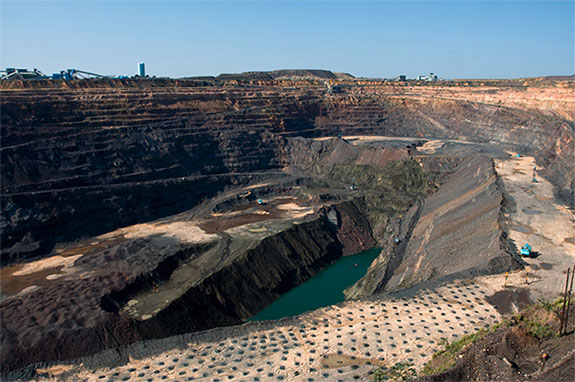De Beers Group and the Government of the Republic of Botswana have agreed to a new 10-year sales agreement that will see Africa's sixth-richest country gradually upping its share of the rough diamonds produced at its prolific Debswana-operated mines from 25% to 50%.
About the size of France, the landlocked republic in southern Africa produces more high-quality diamonds than any other country in the world, except for Russia. Botswana's diamond output was 23 million carats in 2021 and accounted for about 21% of global production.
The country is also the home of the Jwaneng mine, the world’s richest diamond mine by value. Jwaneng and three other diamond mines are operated by Debswana, a 50-50 partnership between De Beers Group and the Government of the Republic of Botswana.
According to the Debswana website, the Jwaneng kimberlite pipe was discovered in 1971 in the Naledi River Valley (Valley of the Star) under 30 meters of Kalahari sand. At the time, there were only about 60 people living in the region, which was called Jwana. The mine’s high-grade ore now contributes between 60% and 70% of Debswana’s revenue.
Last year, the De Beers Group obtained about 70% of its rough diamonds from Botswana.
With the expiration of the previous sales agreement looming on June 30, it was critical for the London-based De Beers Group to secure a deal that would extend the partnership for a new era. Late on Friday, right at the deadline, the two parties announced the new sales contract and mining licenses.
The new 10-year sales agreement will immediately see Botswana claiming 30% of Debswana's production, up from the current 25% and progressively increasing to 50% at the end of the 10-year period. Those diamonds will be sold via Okavango Diamond Company (ODC), which is wholly owned by the Botswana Government.
A new 25-year extension of Debswana mining licenses will secure that joint venture through 2054.
In addition to the sales and mining agreements, De Beers pledged to accelerate Botswana’s economic diversification through the creation of the Pula Diamonds for Development Fund, with an upfront investment by De Beers of $75 million and further contributions over the next 10 years that could total up to $750 million.
De Beers' goal is to create the potential for tens of thousands of new jobs in Botswana, both within an expanded Botswana-based diamond industry and emerging sectors, with a focus on supporting the growth of a knowledge-based economy. Currently, diamond mining accounts for one third of the country's gross domestic product.
“For De Beers it is a privilege to renew our half-century partnership with the people of Botswana," said Al Cook, CEO, De Beers Group. "It is a partnership that is highly regarded around the world for the enduring role it has played in creating economic development and growth. Our transformative agreement reflects the aspirations of the country, secures the future of our Debswana joint venture, and reaffirms De Beers’ leadership position for the long-term.
He continued, "The agreement represents our commitment to deliver investments in Botswana’s diamond production, Botswana’s diamond value chain, Botswana’s knowledge-based economy and, above all, the people of Botswana.”
Credit: Jwaneng Diamond Mine photo courtesy of Debswana.com.

